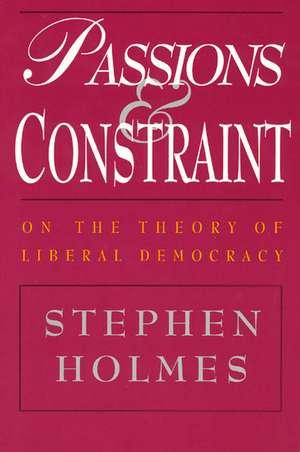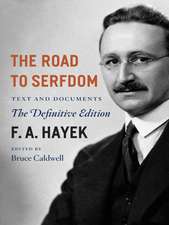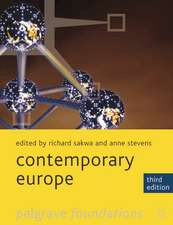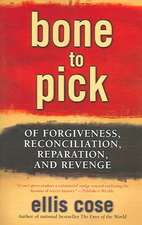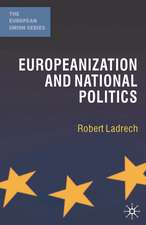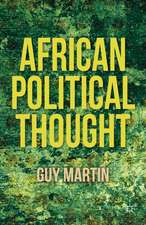Passions and Constraint: On the Theory of Liberal Democracy
Autor Stephen Holmesen Limba Engleză Paperback – 9 iul 1997
In this collection of essays on the core values of liberalism, Stephen Holmes—noted for his scathing reviews of books by liberalism's opponents—challenges commonly held assumptions about liberal theory. By placing it into its original historical context, Passions and Constraints presents an interconnected argument meant to fundamentally change the way we conceive of liberalism.
According to Holmes, three elements of classical liberal theory are commonly used to attack contemporary liberalism as antagonistic to genuine democracy and the welfare state: constitutional constraints on majority rule, the identification of individual freedom with an absence of government involvement, and a strong emphasis on the principle of self-interest. Through insightful essays on Hobbes's analysis of the English Civil War in Behemoth, Bodin's writings on the benefits of limited government, and Mill's views on science and politics, Holmes shows that these basic principles provide, to the contrary, a necessary foundation for the development of democratic, regulatory, and redistributionist politics in the modern era.
Holmes argues that the aspirations of liberal democracy—including individual liberty, the equal dignity of citizens, and a tolerance for diversity—are best understood in relation to two central themes of classical liberal theory: the psychological motivations of individuals and the necessary constraint on individual passions provided by institutions. Paradoxically, Holmes argues that such institutional restraints serve to enable, rather than limit, effective democracy.
In explorations of subjects ranging from self-interest to majoritarianism to "gag rules," Holmes shows that limited government can be more powerful than unlimited government—indeed, that liberalism is one of the most effective philosophies of state building ever contrived. By restricting the arbitrary powers of government officials, Holmes states, a liberal constitution can increase the state's capacity to focus on specific problems and mobilize collective resources for common purposes.
Passions and Constraint is an assessment of what that tradition has meant and what it can mean today.
According to Holmes, three elements of classical liberal theory are commonly used to attack contemporary liberalism as antagonistic to genuine democracy and the welfare state: constitutional constraints on majority rule, the identification of individual freedom with an absence of government involvement, and a strong emphasis on the principle of self-interest. Through insightful essays on Hobbes's analysis of the English Civil War in Behemoth, Bodin's writings on the benefits of limited government, and Mill's views on science and politics, Holmes shows that these basic principles provide, to the contrary, a necessary foundation for the development of democratic, regulatory, and redistributionist politics in the modern era.
Holmes argues that the aspirations of liberal democracy—including individual liberty, the equal dignity of citizens, and a tolerance for diversity—are best understood in relation to two central themes of classical liberal theory: the psychological motivations of individuals and the necessary constraint on individual passions provided by institutions. Paradoxically, Holmes argues that such institutional restraints serve to enable, rather than limit, effective democracy.
In explorations of subjects ranging from self-interest to majoritarianism to "gag rules," Holmes shows that limited government can be more powerful than unlimited government—indeed, that liberalism is one of the most effective philosophies of state building ever contrived. By restricting the arbitrary powers of government officials, Holmes states, a liberal constitution can increase the state's capacity to focus on specific problems and mobilize collective resources for common purposes.
Passions and Constraint is an assessment of what that tradition has meant and what it can mean today.
Preț: 277.53 lei
Nou
Puncte Express: 416
Preț estimativ în valută:
53.11€ • 57.87$ • 44.75£
53.11€ • 57.87$ • 44.75£
Carte tipărită la comandă
Livrare economică 23 aprilie-07 mai
Preluare comenzi: 021 569.72.76
Specificații
ISBN-13: 9780226349695
ISBN-10: 0226349691
Pagini: 352
Dimensiuni: 152 x 229 x 23 mm
Greutate: 0.45 kg
Ediția:1
Editura: University of Chicago Press
Colecția University of Chicago Press
ISBN-10: 0226349691
Pagini: 352
Dimensiuni: 152 x 229 x 23 mm
Greutate: 0.45 kg
Ediția:1
Editura: University of Chicago Press
Colecția University of Chicago Press
Cuprins
Acknowledgments
Preface
Introduction
1: The Liberal Idea
2: The Secret History of Self-Interest
3: Hobbes's Irrational Man
4: The Constitution of Sovereignty in Jean Bodin
5: Precommitment and the Paradox of Democracy
6: The Positive Constitutionalism of John Stuart Mill
7: Gag Rules or the Politics of Omission
8: Welfare and the Liberal Conscience
Conclusion
Notes
Index
Preface
Introduction
1: The Liberal Idea
2: The Secret History of Self-Interest
3: Hobbes's Irrational Man
4: The Constitution of Sovereignty in Jean Bodin
5: Precommitment and the Paradox of Democracy
6: The Positive Constitutionalism of John Stuart Mill
7: Gag Rules or the Politics of Omission
8: Welfare and the Liberal Conscience
Conclusion
Notes
Index
